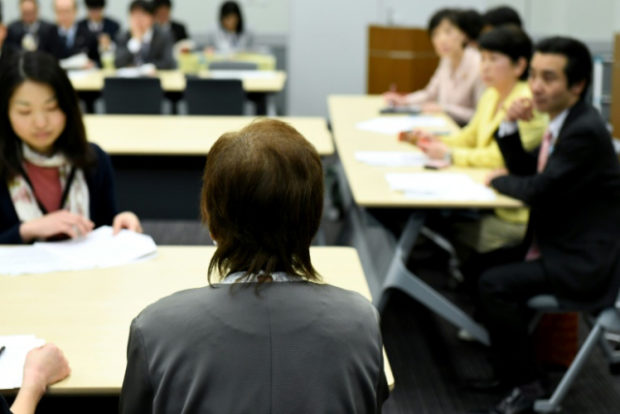
Junko Iizuka (C) has lobbied the Japanese government for two decades but has not received an apology or compensation. Image: Toshifumi KITAMURA – AFP
Junko Iizuka remembers clearly the day she was taken to a hospital as a teenager and forcibly sterilized under a Japanese government program.
Her foster mother gave her a rice ball as they stood by a river, and then took her without explanation to a doctor.
Sometime afterwards, Iizuka, who requested a pseudonym to describe her experience, woke up in a hospital bed with a huge vertical scar across her stomach.
Iizuka, now in her seventies, is one of thousands of men and women forcibly sterilized as part of what has been called a “eugenics” programme, a Japanese law in place until 1996 that mandated the procedure for people judged to have disabilities.
After the operation, Iizuka was sent back to her birth parents and it was only then she understood what had happened, when she overheard them saying she was now sterile.
“That was when my anguish started,” she told AFP at her small, meticulously neat home.
Japan’s health ministry acknowledges that around 16,500 people were forcibly sterilized under the law, which came into force in 1949.
The law allowed doctors to sterilize people with heritable intellectual disabilities, to “prevent the generation of poor quality descendants”.
Another 8,500 people were sterilized with their consent, according to authorities, though lawyers say even those cases were likely “de facto forced” because of the pressure individuals faced.
Iizuka had never been formally diagnosed with a disability, though her foster mother sent her to a home for intellectually disabled children at the age of 14.
Her father later told her that local officials had “repeatedly pushed” him to sign off on the procedure, an operation that has haunted her for decades.
“When I moved to Tokyo to start working, I went to a hospital to ask doctors if they could fix my body,” she said quietly, her voice tight with frustration.
“But it was impossible.”
‘Clear human rights violation’
In her twenties, she turned down marriage offers because she was sterile, though she eventually married and adopted a son.
“But I still envy my friends when I see them receiving visits from their grandchildren,” she said.
For two decades, she lobbied Japan’s government to recognize her suffering, but she always received the same response: the procedure was legal at the time, and no apology nor compensation would be given.
Michiko Sato heard the same line as she lobbied on behalf of her sister-in-law Yumi, who was sterilized as a teenager.
Both of the women, who are in their sixties, asked to be identified by pseudonyms.
“I’ve picked up the gauntlet,” Michiko told AFP. “But to be honest, I feel so empty asking myself ‘why do we have to fight despite this clear human rights violation’?”
Michiko learned about the procedure Yumi was subjected to when she married into the Sato family, more than 40 years ago.
“I was 19, she was 18… When I first heard about it from her mother, I felt so sorry for both of them.”
“I couldn’t ask why, I felt it would be too cruel to her mother to ask,” she said.
“For years I wondered why she had been sterilized, before I learned last year that it had been forced on her at the age of 15.”
A childhood photo shows Yumi as a smiling, rosy-cheeked girl with bobbed hair.
She had learning disabilities caused by an accident involving anesthesia during an operation as an infant.
It was a condition she could not have passed on, but she was sterilized anyway.
With Michiko’s help, she is now suing the government in a first-of-its-kind lawsuit, demanding compensation and an apology.
The government has urged the court to dismiss the case.
‘Years of agony’
“Disabled people are still stigmatized by the general public, and that’s part of the reason I’m doing this,” said Michiko.
She points to the murder last year of 19 people at a center for the disabled south of Tokyo.
The perpetrator claimed he was on a mission to rid the world of people with mental illness.
“We have to change this kind of thinking,” Michiko said.
“Disabled people are human beings, and precious family members.”
The lawsuit has prompted others to come forward, including a man in his seventies who read about Sato’s case and thought: “Isn’t this what happened to me?”
“I’ve been in agony about this for years,” he told reporters recently, speaking on condition of anonymity.
He was sterilized as a teenager. When he married years later, he couldn’t bring himself to tell his wife, only confiding in her shortly before her death in 2013.
“I felt pain when I saw my wife cradling someone else’s baby,” he said.
“I’ve kept this burden in my heart for a long time… I want my life back.”
In March, lawmakers pledged to study compensation for those affected, with plans for a bill on the issue next year.
But victims and their supporters say the process is moving too slowly.
“I am inching closer to my grave,” Iizuka, now battling breast cancer, told lawmakers in March.
“Everyone is aging. Please make progress quickly.” NVG
RELATED STORIES:
Iran official calls for sterilization for sex workers
Fertility doctor sued for allegedly using own sperm on 11 clients
How about a vasectomy? Uganda wants more men to say yes